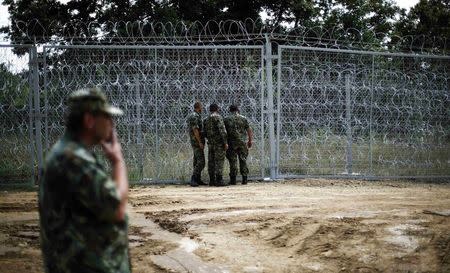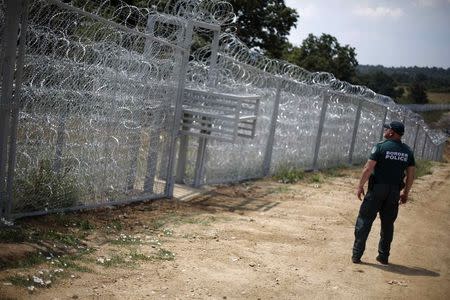Bulgaria's fence to stop migrants on Turkey border nears completion
By Stoyan Nenov GOLIAM DERVENT Bulgaria (Reuters) - Bulgaria has largely completed the construction of a 33-km (21-mile) barbed wire fence at the border with its southeastern neighbor Turkey as it tries to cope with asylum seekers, its defense minister said on Thursday. The EU's poorest country started to build the three-meter-high fence in January, following the example of Greece, which built a similar barrier in 2012 to cope with a soaring number of refugees, mainly from Syria. "This is a facility that prevents the illegal crossing of the border. The aim is to transfer such attempts to the border check points as it is done in every other country," Defense Minister Angel Naidenov told reporters at the border. Bulgaria has struggled to deal with a wave of over 10,000 refugees, mainly Syrians, who arrived last year. In an attempt to limit the influx it deployed over 1,000 police officers along its border with Turkey. In April, campaign group Human Rights Watch (HRW) said in a 76-page report that the Black Sea state violated the rights of asylum seekers by forcing them back across its border into Turkey, sometimes violently, and failed to provide basic humanitarian assistance. Bulgarian authorities have denied any wrongdoing and branded the allegations as "blatant lies which can be easily verified". The United Nation's refugee agency UNHCR has repeatedly appealed to the Balkan country to have an "open door policy" and has expressed concerns about pushbacks at the border with Turkey. "UNHCR in principle is against deterrents such as fences as they do not provide a solution, but create pressure elsewhere. Mothers, fathers and children fleeing war and persecution should be allowed onto the territory of Bulgaria," said Boris Cheshirkov, spokesman for the UNHCR office in Bulgaria. More than two and a half million Syrians have fled the war in Syria, most of them to neighboring Lebanon, Turkey and Jordan. (Reporting by Angel Krasimirov and Stoyan Nenov; Editing by Raissa Kasolowsky)


